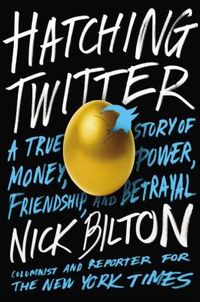

Purchase
A True Story of Money, Power, Friendship, and Betrayal
Portfolio
November 2013
On Sale: November 5, 2013
300 pages
ISBN: 1591846013
EAN: 9781591846017
Kindle: B00CDUVSQ0
Hardcover / e-Book
Add to Wish List
Non-Fiction
Ev told Jack he had to “chill out” with the deluge
of media he was doing. “It’s bad for the company,” Ev
said. “It’s sending the wrong message.” Biz sat
between them, watching like a spectator at a
tennis match.
“But I
invented Twitter,” Jack said.
“No, you didn’t invent Twitter,” Ev replied. “I
didn’t invent Twitter either. Neither did Biz. People
don’t invent things on the Internet. They simply expand
on an idea that already exists.”
In
2005, Odeo was a struggling podcasting start-up founded
by free-range hacker Noah Glass and staffed by a motley
crew of anarchists. Less than two years later, its days
were numbered and half the staff had been let go. But
out of Odeo’s ashes, the remaining employees worked on
a little side venture . . . that by 2013 had become an
$11.5 billion business.
That much is
widely known. But the full story of Twitter’s hatching
has never been told before. It’s a drama of betrayed
friendships and high-stakes power struggles, as the
founders went from everyday engineers to wealthy
celebrities featured on magazine covers, The Oprah
Winfrey Show, The Daily Show, and
Time’s list of the world’s most influential
people.
New York Times
columnist and reporter Nick Bilton takes readers behind
the scenes as Twitter grew at exponential speeds. He
gets inside the heads of the four hackers out of whom
the company tumbled:
• Evan “Ev”
Williams, the ambitious farm boy from Clarks,
Nebraska, who had already created Blogger and sold it
to Google for millions. Quiet and protective, Ev is a
shrewd businessman who made tough choices in the
interest of his companies, firing cofounders and
employees who were once friends. • Jack
Dorsey, the tattooed “nobody” who helped mastermind
the original concept of Twitter, became a billionaire
tech titan, and convinced the media that he was the
next Steve Jobs. • Christopher “Biz”
Stone, the joker and diplomat who played nice with
everyone. As drama ensued, he was the only founder who
remained on good terms with his friends and to this day
has no enduring resentments.
• Noah Glass, the shy but energetic geek who
invested his whole life in Twitter, only to be kicked
out and expunged from the company’s official
history.
As Twitter grew, the four
founders fought bitterly for money, influence,
publicity, and control over a company that grows larger
and more powerful by the day. Ultimately they all lost
their grip on it. Today, none of them is the CEO. Dick
Costolo, a fifty-year-old former comedian, runs the
company.
By 2013 Twitter boasted
close to 300 million active users around the world. In
barely six years, the service has become a tool for
fighting political oppression in the Middle East, a
marketing musthave for business, and the world’s living
room during live TV events. Today, notables such as the
pope, Oprah Winfrey, and the president of the United
States are regular Twitter users. A seventeen-year-old
with a mobile phone can now reach a larger audience
than an entire crew at CNN.
Bilton’s unprecedented access and
exhaustive investigating reporting—drawing on hundreds
of sources, documents, and internal
e-mails—have enabled him to write an intimate portrait
of four friends who accidentally changed the world,
and what they all learned along the way.
Comments
No comments posted.
Registered users may leave comments.
Log in or register now!
| 


 © 2003-2025 off-the-edge.net
all rights reserved Privacy Policy
© 2003-2025 off-the-edge.net
all rights reserved Privacy Policy